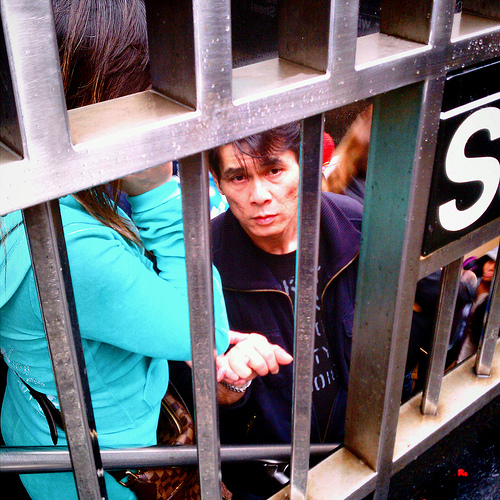Most men lead lives of quiet desperation. – Henry David Thoreau
What does that mean?
This is a slight misquote of what is in the book, but helps make it better understood for most people. And, given the age in which it was written, the word men should now be applied to all people.
The longer version is “The mass of men lead lives of quiet desperation. What is called resignation is confirmed desperation.”
In the book, the desperation is one of meaning and relevance. The book describes how people are locked into a framework of human creation, working to serve the interests of others.
There is little time for serving the interests of themselves, or in trying to find the spark of divinity within themselves. The solution, he said, was to walk away from it all.
Why is not being desperate or resigned important?
The discussion of how to avoid these things will come in the next section. For now, let us concentrate on why being desperate or resigned to our fate is a less than desirable state of affairs. How do you feel when you are desperate? Is that something you would like to experience for every day of the rest of your life?
And resignation is only you giving up all hope of ever being anything other than desperate. Worse still is being quietly desperate. You won’t even speak up to ask for help, or to cry out in anguish. You simply exist in a silent hell, never knowing satisfaction, and only rarely any happiness.
Do you believe that you could live that life for any length of time? I know I would be in a world of hurt if I let myself get there. It is the bottom of the well of hopelessness. It is at the end of the road of ineffective attempts to break free. After a while, you quit trying, and quit believing in yourself.
And what does it say about a society which allows the people to come to that point in their lives, and offer no succor, no hope, no assistance? While it is not the job of society to do these things, it does say something of the character of the members when they refuse to do so.
Where can I apply this in my life?
Have you ever been there? How much effort would you put forth to get out of that place? For those who have been there, what did it take to break out of the trance, to believe you could be free? What words of encouragement provided the spark to start again? Did you do it yourself, or did someone else help you?
At the time of the book, the relocation of the American Indians and what Thoreau refered to as “Negro Slavery” were part of the landscape of the United States of America. A great number of people were simply resigned to living their lives in the same manner as their parents, doing the same jobs, and passing their misery to the next generation.
His solution was to quit the world as he knew it, and live alone, consoled by the bravery of the minks and muskrats. Basically, he wrote off humanity and embraced living alone in the wild. That may be a viable solution for one person, but not a good solution for a society. What would happen if we all did that?
In addition, his solution did nothing to ease the misery of anyone else, it only eased his. Again, that may be a viable solution for one person, but not for a whole society. I don’t think there are enough woods left for all of us to go out and live in them. And that doesn’t include family obligations or any other bond which binds one man to another.
So, as a member of a society, what can we do? The first step is to emancipate ourselves. Where in your life do you feel helpless, desperate, or even resigned to your fate? Why do you believe that? Take a moment and write down the reason or reasons you belive it to be true.
Now what proof do you have that the belief is true? Write down each example and leave some space after it. Do this for every belief on your list. Be as complete and thorough as you can. Once you have exhausted every example you can recall, find at least one counter-example for each.
With the counter-examples in mind, does the belief remain, or has it been destroyed? With the belief destroyed, what belief best represents the counter-examples? What belief best serves your emancipation, your freedom from desperation, your return to hope, normalcy, and to living your life?
If you did the exercise, you should feel better already, unless you are so resigned that you refused to acknowledge any counter-examples. In that case, there is nothing anyone can do to help you, until you decide you want to be helped.
For helping others and serving the greater good, we need only repeat this with anyone we find stuck in quiet desperation. Those still desperate, but not yet quiet will be easier to find, and are likely more willing to accept help. As usual, my recommendation is to start close to home.
If we all help those closest to ourselves, the ripples will be felt across the country, across the continent, across the globe. But it starts with healing ourselves. Then we can work on helping others.
Eventually, society will change, as it is nothing more than tradition plus the will of the people.
What are you willing to do to help, first yourself, then others?
From: Twitter, @Zoraidacz
confirmed at : http://en.wikiquote.org/wiki/Henry_David_Thoreau#Walden first quote
Photo by Timothy Krause








Hi, I first must admit I didn’t read your entire post. I’m looking to better understand what Thoreau meant by saying that many comfort themselves with the bravery of minks and muskrats. The rest of that paragraph makes sense to me, I understand quiet desperation. I just don’t understand the bravery of minks and muskrats. Anyway, I noticed you said “Basically, he wrote off humanity and embraced living alone in the wild.” And I think this is oversimplifying both his experience and his contribution. He was only at Walden for just over 2 years, and spent the rest of his life trying to bless humanity with what he learned there, through his writing. I don’t think his solitary journey was giving up, or writing anything off, but an attempt to find answers.
Thanks for stopping by, and for leaving your comment.
I’m not an expert on Thoreau. As for the bravery of minks and muskrats, that’s probably a question to ask a woodsman of the area. Probably a local expression, and it’s beyond my experience. Best of luck figuring it out.
This is one of my more favorable quotes. I learned it from a man named Tai Lopez. He kept repeating it, so I decided to do some research and found that the knowledge and understanding of that quote was a building block towards success and controlling my own destiny. No one has the power to keep you down but yourself. As soon as people start realizing that they too can be and do whatever they set their minds to, then is when they’ll be headed toward emancipation.
Thanks for stopping by, and for leaving such an inspirational comment.
sometimes you have no choice but to stick it out and endure a hopeless situation, thats where it sometimes takes mental flexability to recognize and appreciate the good parts and make the most of the everything thats outside of the drudgery.
Exactly. We don’t always get to choose our situation. But that doesn’t mean we give up. We can have a life outside that drudgery. It might not be easy, but ways can be found. We only fall into quiet desperation, or worse yet, resignation, when we give up hope. We are stronger than that, even if many of us do not realize it yet.
Thanks for stopping by, and for leaving such a great comment.